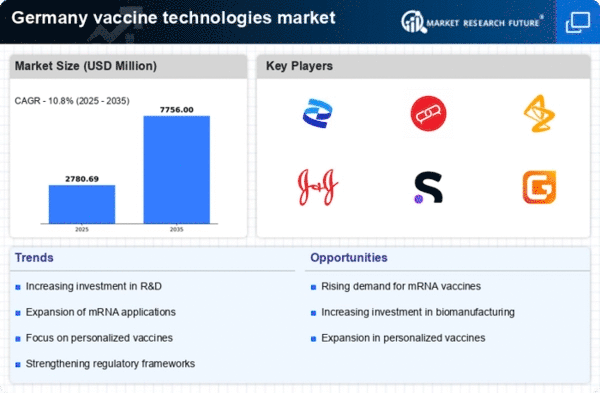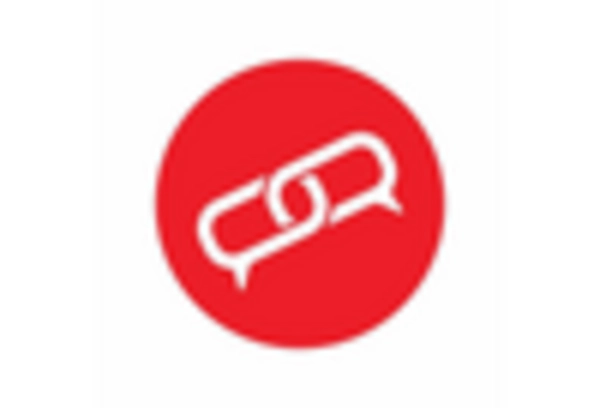Rising Demand for Vaccination
The vaccine technologies market in Germany is experiencing a notable increase in demand for vaccination solutions. This surge is driven by heightened awareness of infectious diseases and the importance of immunization. According to recent data, vaccination rates in Germany have reached approximately 95% for certain childhood vaccines, indicating a strong public commitment to preventive healthcare. The growing population, coupled with an aging demographic, further amplifies the need for innovative vaccine technologies. As the healthcare system adapts to these demands, investments in research and development are likely to rise, fostering advancements in vaccine efficacy and delivery methods. This trend suggests that the vaccine technologies market will continue to expand, supported by both public health initiatives and private sector innovations.
Emerging Infectious Disease Threats
The vaccine technologies market in Germany is increasingly influenced by the emergence of infectious disease threats. The rise of new pathogens and variants necessitates rapid vaccine development and deployment strategies. Recent data indicates that the incidence of certain infectious diseases has increased by 15% in the past year, prompting urgent action from health authorities. This situation underscores the need for innovative vaccine technologies capable of addressing these evolving threats. As a response, research institutions and pharmaceutical companies are prioritizing the development of versatile vaccine platforms that can be adapted quickly to new pathogens. This proactive approach is likely to drive growth in the vaccine technologies market, as stakeholders recognize the importance of preparedness in safeguarding public health.
Government Support and Funding Initiatives
The German government is actively supporting the vaccine technologies market through various funding initiatives and policy frameworks. In recent years, substantial investments have been allocated to enhance vaccine research and development, with funding exceeding €500 million in 2025 alone. This financial backing aims to bolster domestic production capabilities and ensure rapid response to public health challenges. Additionally, the government is fostering collaborations between academic institutions and private companies, creating a conducive environment for innovation. Such support not only accelerates the development of new vaccines but also strengthens the overall infrastructure of the vaccine technologies market. As a result, Germany is likely to see a robust growth trajectory in this sector, driven by strategic government interventions.
Increased Focus on Vaccine Safety and Efficacy
In the vaccine technologies market, there is an increasing emphasis on ensuring vaccine safety and efficacy. This focus is largely driven by public demand for transparency and accountability in vaccine development processes. Regulatory bodies in Germany are implementing stricter guidelines and protocols to ensure that vaccines meet high safety standards before approval. Recent surveys indicate that over 80% of the population prioritizes vaccine safety, influencing market dynamics. Consequently, companies are investing in comprehensive clinical trials and post-marketing surveillance to build public trust. This trend suggests that the vaccine technologies market will continue to evolve, with a strong emphasis on maintaining high safety and efficacy standards, ultimately benefiting public health.
Technological Advancements in Vaccine Development
Technological innovations are significantly shaping the vaccine technologies market in Germany. The integration of advanced biotechnologies, such as recombinant DNA technology and nanoparticle-based vaccines, is enhancing the efficiency and effectiveness of vaccine production. Recent reports indicate that the market for vaccine technologies is projected to grow at a CAGR of 8% over the next five years, driven by these advancements. Furthermore, the adoption of automation and artificial intelligence in vaccine research is streamlining processes, reducing time-to-market for new vaccines. This evolution in technology not only improves vaccine safety and efficacy but also positions Germany as a leader in the global vaccine landscape. As these technologies continue to evolve, they are expected to play a crucial role in addressing emerging health threats.
















